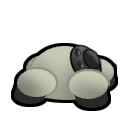Pikeman
| This article is suggested to be rewritten. Reason: Cleanup and format standardization. You can help the RimWorld Wiki by improving it. |
Pikeman
"A clunky multi-legged combat mechanoid specialized as a long-range weapons platform. While effective at distance, it is weak in close-range fights and in melee combat.
Veterans of mechanoid wars know that often, the safest place to be around a pikeman is touching it."
Base Stats
- Type
- Mechanoid – Characters
Armor
- Armor - Sharp
- 40%
- Armor - Blunt
- 20%
Pawn Stats
- Move Speed
- 4.9 c/s
- Health Scale
- 85% HP
- Comfortable Temp Range
- -100 °C – 250 °C (-148 °F – 482 °F)
Melee Combat
Pikemen are a type of slow-moving sniping mechanoid. Like other mechanoids, pikemen are sentient machine-like creatures which do not need to eat, cannot be tamed or trained, and are always hostile to the colony. Pikemen have moderate resistance to sharp damage and very small resistance to blunt damage being able to be taken down by Fist at close range, making them trivial to disable if one can get close enough to them.
They are always equipped with the needle gun, which while not dealing too much damage has an extremely long range and also better-than-average armor penetration.
They can be found sealed in ancient ruins in all biomes, either spawned inside mountains or outside on the landscape. They may also raid the player's base through a random raid-type event and can also be found in most poison ships and psychic ships.
Pikemen are often supported by centipedes, scythers, and lancers, though their speed and range difference often leaves them at the back of the formation.
Like other mechanoids, pikemen are sentient machine-like creatures which do not need to eat, cannot be tamed or trained, and are always hostile to the colony. Pikemen have a moderate resistance to sharp damage, a small resistance to blunt damage
Pikemen will slowly move until they are at range, in which they will stay at maximum range to fire. They will not move around to seek cover, or avoid incoming fighters.
Dead pikemen may be shredded at the machining table or crafting spot for 15 steel though these values are affected by mechanoid shredding efficiency as well as missing parts on the pikeman.
Combat & Strategy
Pikemen play a supportive role, providing firepower at long range to keep your colonists' heads down while the other mechs deal the damage.
Their damage output is atrocious: their needle gun deals a measly 15 damage, has a slow fire rate, and pikemen themselves are not good snipers, equivalent to a level 8 shooter only. However the needle gun has a huge range, analogous to a charge rifle, and its piercing value means it can be lethal even against well armored pawns if the pikeman is lucky enough to hit the right bodypart. In large groups they are not to be underestimated by unshielded units, and don't expect basic mini-turrets to be able to hit them.
As the description says, engaging pikemen at close range can be a viable way to take them down, once all others have been dealt with.
Armor
Health
Note, that due to mechanoids having different body part structures, this table is only provided as a rough guide.
Trivia
The line in the description, "Veterans of mechanoid wars know that often, the safest place to be around a pikeman is touching it." is copied almost verbatim from a previous version of the Lancer's description, namely: "Veterans of mechanoid wars know that often, the safest thing to do against a lancer is to charge."
Version history
Introduced in 1.1.
